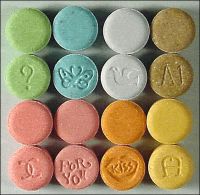Can a peace drug clean up the war mess?
 |
Scientific American reports from the MAPS conference.
Michael Bledsoe's story begins like that of many other Iraqi war veterans. In 2007, he was chasing insurgents through Anbar province when a roadside bomb exploded, breaking Bledsoe's back and both his feet. A former Army Ranger working as a security contractor, Bledsoe soon knew his high-paying military career was over.
Back home, Bledsoe (not his real name) felt angry almost constantly. Nightmares haunted him. He withdrew and became isolated. "It was a serious sense of loss," he says. His psychiatrist quickly diagnosed post-traumatic stress disorder (PTSD).
Despite months of talk therapy, the nightmares continued, and Bledsoe grew desperate. Then "something almost miraculous" happened, he says. An online search brought him to a unique study of the banned drug MDMA (3,4-methylenedioxymethamphetamine), well known as the street drug ecstasy. The 21-patient study, sponsored by the nonprofit Multidisciplinary Association for Psychedelic Studies (MAPS), launched in 2004 as the first U.S. clinical trial of a psychedelic drug in 35 years.
After several bond-building sessions with psychiatrist and study leader Michael Mithoefer and a co-therapist, Bledsoe swallowed a white tablet, donned eyeshades and reclined in Mithoefer's comfortable Charleston, S.C., office. Over the next eight hours, Bledsoe revisited the explosion and recounted the trauma to Mithoefer. After two more MDMA-assisted psychotherapy sessions, Bledsoe says his PTSD symptoms were "completely eliminated."
|

Recently @ DoseNation
|
|






















The comments posted here do not reflect the views of the owners of this site.